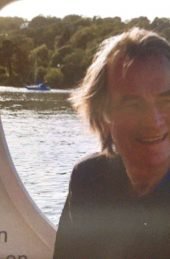Michael Barritt, what first attracted you to naval history?
My tutor at Oxford was Piers Mackesy, who was working on seminal books on the period 1793-1815, and this focussed my own interest. My subsequent career as a hydrographic specialist in the Royal Navy broadened my own researches, particularly into subsequent decades of the nineteenth century.
Can you tell us a little about how you research? Has the process changed over the years?
My bed-rock has been the wonderful archive of the UK Hydrographic Office, where manuscript surveys and reports have been preserved which span the past five centuries. Inspection of these has led me on to pursue information on the compilers in other archives such as TNA.
Availability of digitised original documents has changed my approach to some degree, but access to these is very variable. Libraries in Scotland and the USA and elsewhere are far more generous and helpful than in England, where income generation is expected and free access is restricted.
The common phrase is that history is written by the victors. Do you think this is true?
Not entirely, for many of the characters in my books would be regarded as on the periphery, and many did not receive recognition in their life-time. Inasmuch as grand campaigns and famous victories tend to dominate the historical narrative, there is some truth in the adage. Hence my reference in Nelson’s Pathfinders to a ‘forgotten story’.
Are there any historians who helped shaped your career? Similarly, can you recommend three history books which budding historians should read?
Piers Mackesy was a vital early influence. During my research in recent years I have received encouragement, wisdom and strategic guidance from John Sugden, Roger Knight and Andrew Lambert.
Three history books from which I have profited recently are:
Unfinished Empire: The Global Expansion of Britain John Darwin (London, Allen Lane, 2012) a brilliant, balanced, yet thought-provoking analysis, demonstrating a masterly command of sources.
The Bounty Caroline Alexander (London, Harper-Collins, 2003) which shows how a hunt for new sources can offer completely new insights into a story which has been told many times before.
The Trade Winds ed. C Northcote Parkinson (London, Allen & Unwin, 1948), a collection of brilliant examples of concise but authoritative studies of British overseas trade during the eighteenth and early nineteenth century.
If you could meet any figure from history, who would it be and why? Also, if you could witness any event throughout history, what would it be?
As a Christian it would have to be Jesus Christ and his ministry on earth. Otherwise, I would like to meet and talk to my paternal great-great-great (-and great) grandfather(s) who lived through the period 1790-1832 with tumultuous events on the world scene and profound impact on British society.
If you could add any period or subject to the history curriculum, what would it be?
The key stages, as described on HMG’s web-site, seem to provide for all periods, but I have no knowledge of how good the spread of study is in schools, and how it is influenced by examination content.
I would join with many historians and thinkers, notably Andrew Lambert, in suggesting that there is a disturbing lack of awareness nationally of the importance of the sea to this island nation, and of the need to nurture sea power. This theme of our national history is not high-lighted in the key stages.
If you could give a piece of advice to your younger self, either as a student or when you first started out as a writer, what would it be?
Actively seek advice, and listen to it when it is given. My early products would have benefited had I done this. Nelson’s Pathfinders has been shaped by wise counsel from a range of good and generous friends in the field.
Can you tell us a little bit about the project you are currently working on?
I have a more specialist book, giving more detail of the RN hydrographic practitioners of the period 1793-1823, which I am preparing for publication. I am also working on a biographical study of a naval lieutenant from the period. Lack of information on extensive periods of his life is leading me into my first venture into historical fiction. Thereafter I want to tell the story of my nineteenth-century precursors in British waters, working in rudimentary paddle-steamers.
Michael Barritt served in the Royal Navy and is the author of Nelson’s Pathfinders.







